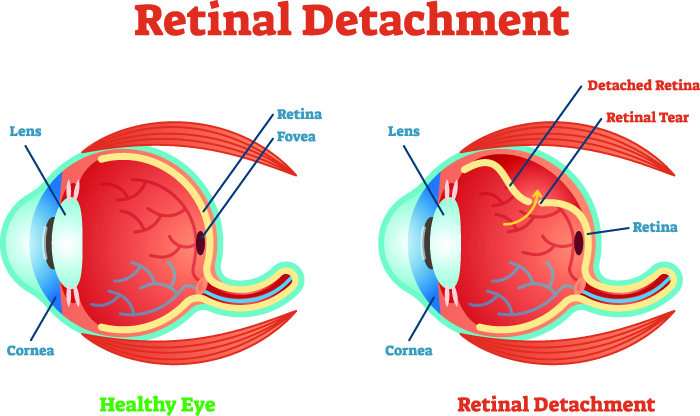Retinal Detachment Treatment in Koramangala, Bangalore
The retina is a thin, light-sensitive membrane that is located at the back of your eye. It converts the image of an object into light signals and sends them to your brain via the optic nerve.
Retinal detachment occurs when the retina gets detached from the back of your eye.
What do we need to know about retinal detachment?
The retina is a kind of an organizer of visual information, and it works with the lens, cornea and optic nerve to form a complete image. The detachment separates the retina cells from the blood vessels which provide it nourishment.
Retinal detachment results in loss of partial or complete vision. If left untreated, there can be permanent vision loss. You can search online for a retinal detachment specialist near me, if you spot a sudden change in your vision.

What are the types and causes of retinal detachment?
There are three types of retinal detachment:
- Rhegmatogenous retinal detachment
In this type of detachment, you might have a tear or hole in your retina which allows your eye fluid to slip through the opening and get behind the retina. This fluid then separates the retina from the blood vessels, which stops oxygen or nourishment to reach it. Hence, the retina detaches. This is the most common form of retinal detachment and is mostly caused by ageing. - Tractional retinal detachment
This happens when the scar tissue grows and contracts on the retina, which causes it to pull away from the back of the eye. This is not as common as the rhegmatogenous retinal detachment and is typically observed in people with poorly controlled diabetes. - Exudative detachment
In this type of detachment, there are no tears or breaks in the retina. Fluid accumulates behind the retina itself. This can be caused by an inflammatory disorder, tumors, cancer, injury to the eyes or age-related diseases.
What are the symptoms of retinal detachment?
Retinal detachment does not cause any painful symptoms, but some signs that you must watch out for are,
- Blurred vision
- Partial loss of vision
- Seeing blacks floaters or spots before your eyes
- Loss of peripheral vision
- Flashes of light in one eye or both
When do you need to see your doctor?
You must seek immediate medical attention if you are having symptoms of retinal detachment. It can result in permanent loss of vision if left unchecked. You can look for retinal detachment doctors in Bangalore.
You can request an appointment at Apollo Spectra Hospitals, Koramangala, Bangalore.
Call 1860 500 2244 to book an appointment.
How do you prevent retinal detachment?
There’s no specific way to prevent or predict retinal detachment, but you can be cautious and wear eye protection while using tools or playing sports. You should also keep your blood sugar levels in check. And get yearly eye exams done, if you are at risk.
How is retinal detachment treated?
In most cases of retinal detachment, surgery is conducted to repair the detached retina. If it’s a small tear, the surgery is a minor procedure. For more details, you can contact retina detachment hospitals in Koramangala.
Conclusion
Retinal detachment is a serious condition, which can result in permanent loss of vision if left unchecked for a long time. If you experience any of the symptoms mentioned above, you should treat it as a medical emergency and get yourself checked. If detected early, most patients regain their full vision, but some might experience a partial loss.
Retinal detachment is very rare in children. It is most commonly experienced by adults between the age of 40 and 70 years. Natural ageing causes some changes in the vitreous gel which oftentimes results in tears or holes in the retina.
It is more common in people who are old, have nearsightedness, have a family history of retinal problems, complications during cataract surgery, have faced trauma in the eye or have posterior vitreous detachment.
A detached retina won’t heal on its own. It will only get worse and more serious and result in complete vision loss. If you are experiencing symptoms of a detached retina, go to a doctor immediately.
Symptoms
Our Doctors
DR. SHALINI SHETTY
MBBS, MS (Ophthalmol...
| Experience | : | 30 Yeras Experience |
|---|---|---|
| Speciality | : | Ophthalmology... | Location | : | Koramangala |
| Timings | : | Available by prior a... |
Our Top Specialities
NOTICE BOARD
CONTACT US
CONTACT US
 Book Appointment
Book Appointment



.svg)
.svg)
.svg)
.svg)








